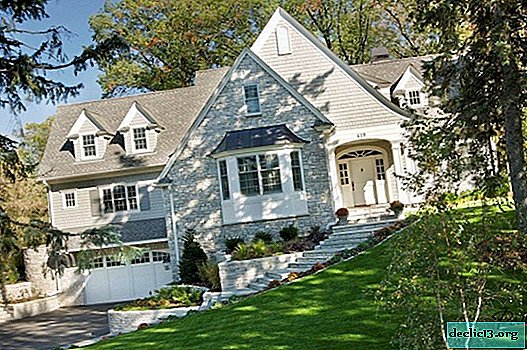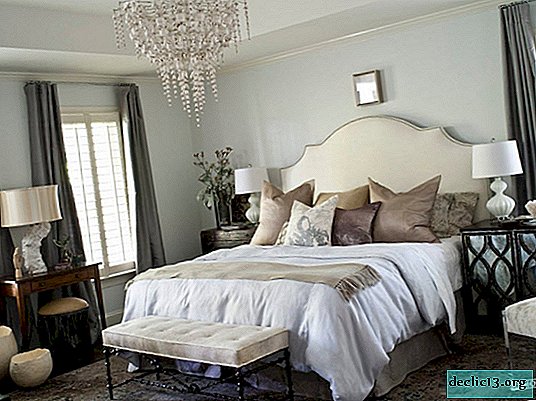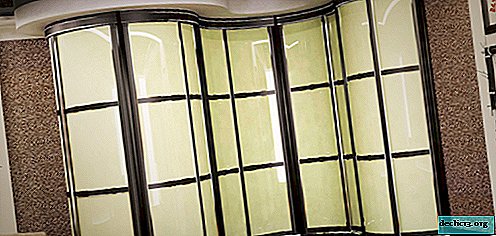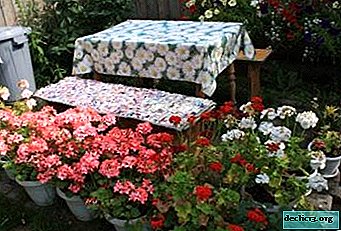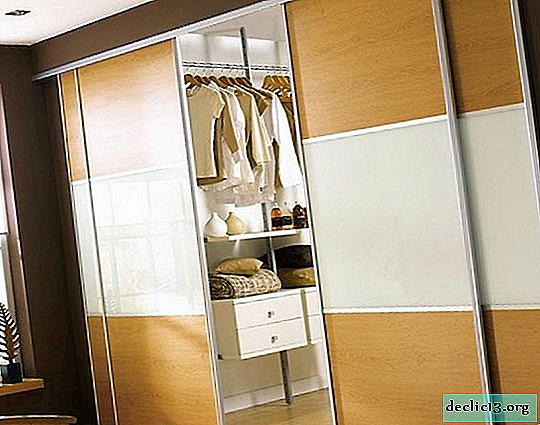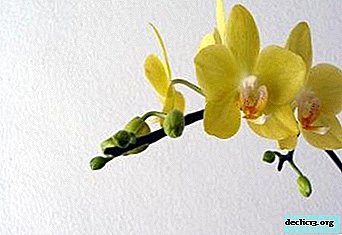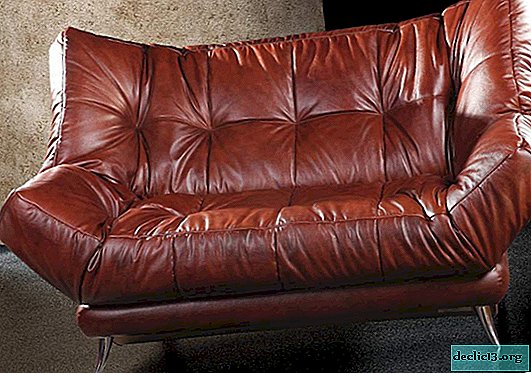Bathroom tiles - 2019 trends
The design of bathroom surfaces using tiles is the most popular finish option not only in our country, but also in the world. It is difficult to find an equally strong, moisture-resistant, reliable, heat-resistant and durable material for wall cladding in a room with a unique microclimate. Facing tiles are good both in solo use and as an element of the combined decoration of the bathroom. Like most areas of interior design, tile lining of bathrooms has its own trends, relevant design ideas, and design novelties. We suggest you familiarize yourself with them on the example of our large-scale selection of design projects for bathrooms.


Facing tiles for the bathroom - advantages and disadvantages
Repair in the bathroom is usually done for several years. Therefore, it is necessary to choose a material for surface finishing with certain technological qualities - a high level of moisture resistance, resistance to temperature changes and mechanical stress. In addition, in such utilitarian rooms as a bathroom and toilet, it is necessary to maintain cleanliness close to ideal, which means that the finish should be easy to wash and calmly tolerate the effects of cleaning chemicals. Agree that few finishing materials can pass such a test for strength. But ceramic tile, and speaking of the facing material for the bathroom, we most often mean it, it is capable of retaining its original appearance for a long time.



So, the advantages of tiles as a finishing material for a bathroom include the following:
- high moisture resistance;
- resistance to constant temperature changes;
- durability;
- resistance to various types of mechanical stress;
- the tile does not fade in the sun and does not lose the brightness of products;
- wide range of colors and textures;
- the ability to simulate various surfaces (wood, stone, products with a metallic sheen);
- a wide range of sizes and shapes, allowing you to find finishing solutions for rooms of any shape and size with minimal loss;
- a large selection of manufacturers with different cost of goods, allowing you to find a solution for designing a bathroom for the owner of apartments and houses with different financial capabilities.



But, like any other finishing material, facing tiles have their drawbacks:
- the rather high cost of the material itself (when compared with such types of finishes as painting, the use of decorative plaster, wall panels), glass and stone tiles are especially expensive, even artificial marble stone, for example, is not cheap;
- the need to hire a specialist for tile installation (the cost of laying 1 square meter of material is usually equal to the cost of the tile itself - the more expensive the finish, the more you will have to pay for its installation);
- tiles made of natural stone need special care - not all cleaning products can be used, periodically you need to grind and process the stone;
- when using curly tiles or mosaics, a large number of inter-tile seams are formed that can cause fungus - prevention with antiseptics and periodic grout replacement are necessary.



Finishing tile material
The most popular material for the manufacture of tiles is ceramics. The reasonable ratio of price and quality, technological and aesthetic characteristics, has made ceramic tiles almost synonymous with decoration in the bathroom. Ceramic tiles can be of different shapes and sizes, plain or with a pattern, smooth or textured, with imitation of wood or stone, homogeneous or with various inclusions - there are many options for creating the finish of your dream. We examined the advantages and disadvantages of ceramic finishes in the previous block, but I would also like to note other options for the performance of the facing material.



Glass tile
Finishing a bathroom with glass tiles is not common, and the uniqueness of such design projects is much higher. Even small inserts made of glass cladding tiles can "revive" the most ordinary image of a utilitarian room. But this material has its drawbacks - in addition to a fairly high cost, glass tile always creates a somewhat cool image of the room. Glass tiles are most often produced in color. Many owners of houses and apartments choose this material to create panels on the wall of the bathroom with photo printing. A drawing can be anything from a beautiful landscape to a family portrait.




Tiles made of natural or artificial stone
Facing tiles are made of granite, marble, basalt, sandstone and other stones. But the high cost of finished products, in particular marble, encourages homeowners to buy artificial analogues that are not inferior in aesthetic qualities. Very often, tiles made of artificial material cannot be distinguished from natural raw materials, but the physical properties of such products, of course, vary. Of course, an artificial stone will not last for your family for decades, but it is much cheaper than natural, easier and easier to assemble.


 Imitation of marble always brings a luxurious image to the interior of the bathroom, a touch of elegance and nobility. This finishing material is perfect for creating modern images of rooms and classic interiors.
Imitation of marble always brings a luxurious image to the interior of the bathroom, a touch of elegance and nobility. This finishing material is perfect for creating modern images of rooms and classic interiors.



Glitter Tile
If metal powder is added to the ceramic composition for the manufacture of tiles or mosaics, the result always exceeds all expectations. Products with silver, golden or copper sheen can bring a festive, luxurious mood to any interior. Even in rooms of small area, it is appropriate to use metallized tiles as a decorative element, not without all the advantages of ceramic products. No less effect can be achieved by using mirror tiles - you can select zones, emphasize the geometry of the room or just create original compositions, panels.


Variety of shapes and sizes - current ideas
The choice of shape and size of tiles for finishing a bathroom depends on the following factors:
- the size of the room;
- the surface to be lined (floors, walls, facade of a bathtub or other plumbing, storage systems, various decorative elements - wall or floor panels, drawings);
- style of interior design;
- personal preferences of the owners of the utilitarian premises.


Large tiles visually can increase the volume of the room (although for this it is better for it to be executed in bright colors). Recently, it has been fashionable to use large rectangular ceramic and porcelain products not only for flooring, but also for wall decoration. But it is important to understand that in a small room with the wrong geometry of waste, the finishing material of large sizes will be more than when choosing dies of the appropriate scale.



Overseas, "metro" tiles have been very popular over the years. Finishing material got its name due to its initial use for decorating metro stations. And now, a tile laid by type of brickwork is considered one of the classic bathroom design options. Tiles "metro" can be glossy or matte, smooth or with bevels around the perimeter (the so-called fez). It can be used with a grout of the same tone or contrasting shade. Depending on this, various images of bathrooms are obtained even when using tiles of the same size and color.




Dark tile "metro" (in our country it is sometimes called "boar") in combination with light grout looks especially impressive. The geometry of the masonry is emphasized by the contrast of colors. Similarly, a spectacular image of the bathroom can be achieved by using a dark or bright grout between light, pastel ceramic tiles.



Rectangular tiles laid vertically can visually increase the height of the room ...



And the original herringbone styling will not only bring diversity to the bathroom decoration, but will also make its interior more creative.


The decoration of any surface of the bathroom, made with the help of tiles, which is often called "bee honeycombs," looks original. Ceramic hexagons really remind honeycombs and are available in various sizes and colors.

Mosaic
Mosaic has all the technological advantages of ceramic tiles, but it can be used to finish surfaces that are difficult in terms of geometry. Mosaic tiles can be lined with arched and ordinary niches, countertops near the sink, bathtub façade, storage systems and various accessories for utilitarian spaces. Mosaic is available in different sizes and shapes of the so-called chips (small dice). Mosaic, as well as ceramic tiles, can be smooth or textured, plain or with color inclusions, imitate masonry, have a metallic sheen.




Figure tiles
Using curly tiles, you can veneer all the walls or floors of the bathroom, and create an accent surface. Even a monochromatic tile of light tones looks extraordinary, original, thanks to its extraordinary shape. But curly tiles also have their drawbacks - the length of the inter-tile seams is significantly greater than the material of the usual form. This means that grouting will be required more, and the risk of a fungus without timely processing will be higher. But all these minor defects are covered by the original design of the material itself and the surfaces obtained as a result of installation.





Embossed tile
Textured tiles can bring into the interior of the bathroom not only variety, but also creativity. As a rule, relief products for wall cladding are made in a plain light version and textured bends, depressions and bas-reliefs are emphasized with the help of light. Most often, textured tiles are used to clad one wall to create some emphasis.





Combination of shapes, sizes and colors
The combination of tiles of different shapes, sizes and colors can lead to the creation of not only attractive, but also creative images of bathrooms. In addition, using colored inserts, you can highlight certain elements and zones of the interior, visually change the volume of the room and create color accents, which are so necessary in a bright space. It is fashionable to color a mirror with a fringing on a light background, to outline panels, to select a zone of a shower, bath or sink.




No less effect can be achieved by combining tiles of the same shape and size, but different shades from the same color group. This method of decoration can be used both for decorating walls (or parts thereof), and as a floor covering.


In addition, ceramic tiles can be combined with other types of finishing materials. Of course, tiles must be used as a finish on the most vulnerable areas in terms of moisture - around the bathtub and sink, inside the shower. Most often, a so-called apron is laid out from the tiles or completely surface behind the bathroom - it all depends on the location of the plumbing in the bathroom.




A popular color palette for decorating the bathroom
There are certain color trends that dictate to us designers around the world. But there are also color solutions that will be relevant at all times. If your bathroom has a very modest area or a non-standard shape, then snow-white tiles may be the only worthy choice to create a light and light image of the interior. The white color in most of us is associated with cleanliness and freshness - important qualities of the room for water and sanitary procedures. On a white background, the glitter of chrome bathroom accessories looks great and perfectly matches any version of storage systems and other additional interior elements.



The gray color, which became so popular last season, does not lose its leading position in the top list of color solutions for rooms with the most diverse functional load. Bathrooms are no exception. A rich palette of shades of gray allows you to create strict, but at the same time elegant images of utilitarian rooms, not devoid of their zest. In addition, on a gray background, the brilliant whiteness of plumbing looks especially impressive.





For many years, a wide range of shades of blue has been considered a popular color scheme for decorating a bathroom. From pale blue as the main background to dark blue in the form of accent fringing or small inclusions - the blue color always creates a cool, light and fresh atmosphere in the interior of a utilitarian space. Snow-white plumbing goes well with various shades of blue. Many designers recommend using glass partitions and sliding shower doors of a similar shade in an alliance with light blue tiles.





If the creation of a cool color palette in the bathroom does not suit you, if instead of energy and tone you would like to get a warm atmosphere and relaxation, then use a beige palette to decorate your utilitarian space. All shades of beige can be considered neutral from the point of view of creating a certain atmosphere in the room, but they definitely bring warmth to the character of the room, to its decor.





In the wake of the popularity of all natural, including shades for creating finishes, many varieties of green have come into fashion. Shades from light olive to dark moss and deep emerald are actively used by designers around the world. After all, green color favorably affects our psyche, contributes to the creation of a fresh and relaxed atmosphere. But at the same time, the interior of the bathroom, in the decoration of which a shade of green was used, can never be called boring, ordinary.




Tile with ornament - to be or not to be? Designers who create modern projects are increasingly leaning towards solid-color options for ceramic materials. But for some stylistic trends in the field of housing design, the use of tiles with colorful ornaments or patterns is simply necessary. For example, some varieties of country styles (Mediterranean, rustic), beach and eclecticism can not easily accept a bright print of ceramic tiles, but also win in terms of originality.


The most organically looks tile with a bright, colorful ornament as a flooring material in a bathroom with plain, light walls. Two contrasting colors are sufficient to produce such a printed tile.






